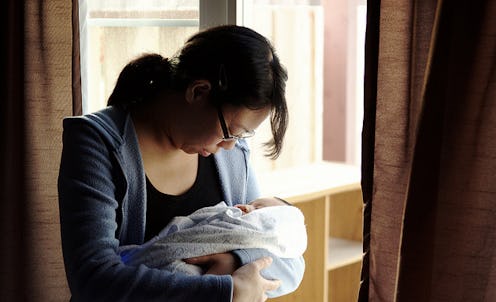
American parental leave policies have been under a major microscope lately — and with good reason. On top of the existing problems, research data from Abt Associates for the Department of Labor just found that one-quarter of new moms return to work within two weeks of giving birth. That's right — just two weeks! And that's not even the most alarming stat they dug up on the matter. The United States remains the only developed nation in the world without mandatory paid leave for parents, and despite major tech companies like Netflix have initiated new and improved leave policies for their own employees, the state of things remains pretty bleak for millions of working American parents.
For the study, researchers surveyed 2,852 workers who took a leave of absence from their employer in 2012, 93 percent of whom were moms. Of those mothers, 12 percent took just one week of maternity leave, while 11 percent took between one and two weeks off. For the record, doctors pretty much universally advise taking six weeks off postpartum to recover, since, you know, things like pushing a baby out of your vagina or undergoing major surgery during a c-section are kind of a big deal. And as such, women need more than a few days to bounce back from it all — physically, mentally, and emotionally.
Needless to say, it's not that these new mothers don't actually want to take the time off; it's that many of them don't have access to the type of leave that they need in order to do so. When polling new moms in the study, researchers found that more than half of them returned to work sooner than they would have liked.
They also found that there are huge education and wealth gaps regarding who actually has access to maternity leave: 80 percent of the women who took at least six weeks leave had a college degree, while just 54 percent of those without a degree were able to. Additionally, researchers found that higher-earners were more likely to have paid maternity leave options available to them. According to a report on the research by Sharon Lerner for In These Times, "More than one in five of the top 10 percent of earners are getting paid family leave, compared to one in 20 in the bottom quartile." Learner also cites another figure from the The Bureau of Labor Statistics, which found that just 13 percent of working mothers have access to any sort of paid maternity leave at all.
If you're wondering just what new realities this situation creates for new mothers, you can be sure they're often devastating. Lerner's report shared stories of several new mothers who had to leave their new babies behind soon after giving birth, and honestly, I found each and every one of them to be heart-wrenching. One such story was from 29-year-old Natasha Long, a factory worker who had no access to a lactation room at work, which forced her to pump her breast milk while sitting outside in her car. In the report, journalist Sarah Lerner shares:
She sat in the cab, worried that someone might see her, and pumped, while tears rolled down her face and over the plastic suction cups attached to her breasts. Long cried because she wanted to be holding her baby rather than sitting in the parking lot of a factory in her old Yukon Denali.
Science has also found that there can be huge emotional, economic, and physical consequences that come from new mothers going back to work too soon — including children being more likely to suffer developmentally. Other studies have also linked shorter maternity leaves with postpartum depression, and returning to work with why many new mothers stop breastfeeding early.
Sure, there is some good news on the horizon: After Netflix announced it will offer one full year of paid leave to new parents (who will receive 100 percent of their salary during that time), a bunch of other companies hopped on the bandwagon, too. Not long after, Microsoft announced an improved parental leave plan, as well, upping their paid time off to 12 weeks for moms and dads. Private equity firm KKR & Co. struck an improved deal for working moms, too, offering compensation to help parents cover the costs of traveling with their nannies in tow on work-related trips. But let's be real: When you consider the sheer number of other American companies with poor maternity leave policies out there — and the fact that the women who suffer most are the ones who are making the least — the need for a a universal parental leave policy has never seemed more important.
In the end, it's all pretty simple: It should be our right to spend time with that kid we carried around for nine months, and our right to recover after going through such a life-changing and body-changing event. And it's not even just about birth moms — partners should be given the right to take time off and help out during those first weeks at home with a baby, too, for bonding, emotional support, and all the rest. "Families need paid time off to take care of their new babies," wrote Lerner in her report. "Men, women and children will gain from this basic human dignity." Hear that, U.S. employers? It's high time you take note.